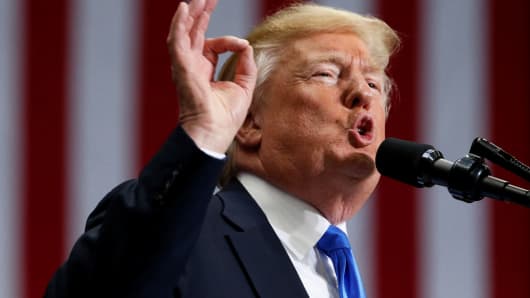An unwritten rule in politics is: If you can't get the public to like you, help them find someone they like even less. President Donald Trump may have done just that in the health-bill wars by shining a light on health insurance companies and members of Congress.
He hit those two birds with one stone in this single tweet Monday morning:
tweet
President Trump is referring to the massive direct and indirect subsidies the health insurance companies have enjoyed thanks to the Affordable Care Act and the employer-provided funds members of Congress and their staffs receive to buy health insurance on the Obamacare exchanges.
Let's start with the health-insurance companies. The bottom line is that the industry has been enriched significantly by Obamacare. The shares of Aetna, Anthem, Centene, Cigna, Humana, and UnitedHealth have all outperformed the overall stock market, which has had a solid run, since 2010.
But even before those new profits came pouring in, health insurers weren't exactly loved. Premiums were rising faster than income growth in America for years and those costs were increasingly becoming a middle class problem. Doctors and medical staffs were becoming more and more frustrated with the way insurance companies were taking control of how patients were treated and basically how much everyone in the medical industry was paid. That frustration is still very much out there today.
But during this Obamacare repeal and replacement process, the insurers have more than secured their financial position — they've assumed such a supreme level of undeserved importance in America that politicians on both sides of the partisan aisle act as if propping them up is of the greatest national importance. To be fair, health insurance can and should serve a role in providing healthy and relatively healthy people some kind of hedge against an unexpected major or emergency medical cost. But its usefulness as a middleman industry to cover costs for routine check-ups and procedures is dubious at best. In short, it's the wrong fit for customers, providers, and a road block for a natural free market price-reduction process.
President Trump's decision to question special government payments to insurers will gain traction if he keeps it up. Remember, he's not bashing the doctors many Americans trust or the hospitals we rely on. He's going after an entity most of us never really see with employers most of us never meet.
But even if you don't buy the idea that most Americans will get behind President Trump bashing or at least questioning the health insurers, it's much easier to see the wisdom of shining a light on and threatening any and all special perks members of Congress enjoy compared to the rest of us. Just to clarify things, President Obama's Office of Personnel Management made a controversial move in 2010 to direct members of Congress and their aides to buy insurance from a part of the District of Columbia exchange designed for small businesses. They pick from a selection of the most generous small group plans on sale in that exchange, but only pay about 25 percent of the premium themselves. The rest of the cost is covered by the House and Senate budget. It's a nice perk and really no change from the cushy health-care benefits Congress and congressional staffers enjoyed before Obamacare.
By threatening that perk, President Trump has broken an unofficial agreement within the political class not to mess with professional courtesies. It's that agreement that guarantees automatic pay raises for members of Congress and other cases of special treatment. But it's a good bet a major section of the American people will join in his scrutiny of Congress, even if they don't also start to back the White House generally.
And while the public may just want this debate to go away, leave Obamacare in place, and move on, there is no moving on from this issue. Because right now, insurers are demanding to know what kinds of subsidies and other government aid they'll be getting to remain in the Obamacare exchanges for 2018. And lots of members of Congress from both parties are as eager as ever to secure those subsidies and aid in all their crony capitalist glory.
Now, President Trump has at least started to use a weapon that can not only reopen the Obamacare repeal process, but do so in a way that gives all members of the House and Senate a new sense of urgency. Let's see if Capitol Hill gets the message.
Commentary by Jake Novak, CNBC.com senior columnist. Follow him on Twitter @jakejakeny.
For more insight from CNBC contributors, follow @CNBCopinion on Twitter.



